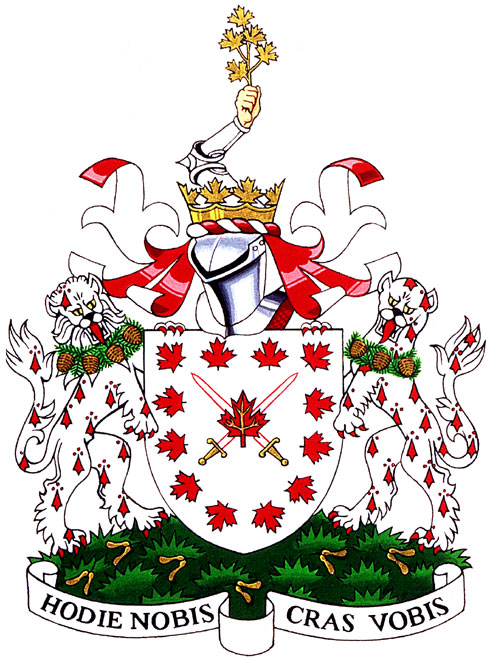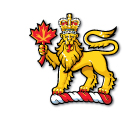- The Governor General of Canada

The contents of this Register are intended for research purposes only. The heraldic emblems found in the Register may not be reproduced in any form or in any media without the written consent of the Canadian Heraldic Authority and/or the recipient.
The Army Cadet League of Canada
Ottawa, Ontario
Grant of Arms, Supporters, Flag and Badge
March 31, 1995
Vol. III, p. 8

[ previous page ]
Blazon
Arms
Argent two swords in saltire Argent fimbriated Gules hilted and pommelled Or surmounted by a maple leaf Gules veined Or all within an orle of twelve maple leaves stems inward Gules;
Crest
Issuant from a coronet erablé Or a dexter arm in armour embowed Argent the naked hand proper grasping a maple sapling Or;
Supporters
On a grassy mound set with maple seeds Or dexter a young lion sinister a young lionness both Argent semé of ermine spots Gules each guardant and gorged with a collar of pine Vert and pine cones Or;
Motto
HODIE NOBIS CRAS VOBIS;
Symbolism
Arms
The white shield, bearing a maple leaf and crossed broad swords, alludes to a central Canadian entity with direct connection to the military. The twelve smaller maple leaves show singleness of purpose but at the Branch level.
Crest
The crown of golden maple leaves shows the worth and stature of the League’s undertaking. The knightly armoured forearm is a sign for honour, strength and soldierly experience behind the hand that has been entrusted with and sustains the youth of the Royal Canadian Army Cadets, represented by the gold maple branch.
Supporters
The green grassy mound with maple seeds portrays the homeland which has brought forth the youth and for which they stand. The colour white of the supporters connotes a “clean slate” which has yet to be impressed upon, and the red ermine spots show their noble nature. The royal fur of ermine also gives the cadets a sense of their identity, acting for Canada. The collars of green pine signify the outdoor training advocated by the League and the gold pine cones show its worth.
Motto
Meaning “Today, our cause; tomorrow, yours”, this phrase implies tradition maintained from one generation to another.
